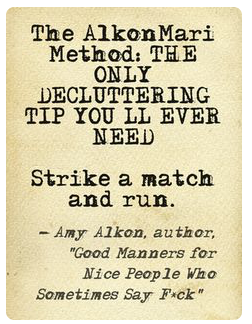At Aeon, Amy Olberding is not impressed with the pseudo-philosophy of the Marie Kondo cult:
Inspired by an episode of Tidying Up with Marie Kondo on Netflix, I cleaned my dresser drawers this weekend. It was a generally satisfying way to shirk work duties (the reason I watched Netflix in the first place). Yet, despite my neater bureau, I find the popularity of Kondo’s ‘tidying’ unbearable. We are awash in stuff, and apparently so joyless that the promise of joy through house-cleaning appeals to us. The cultural fascination sparked by Kondo strikes me as deeply disordered.
As a scholar of East Asian philosophies, one pattern in the Kondo mania is all too familiar: the susceptibility of Americans to plain good sense if it can but be infused with a quasi-mystical ‘oriental’ aura. Kondo is, in several ways, a Mr Miyagi for the anxious, late-capitalist, consumerist age. Unlike the Karate Kid, we are bedevilled by our own belongings rather than by bullies – but just as Mr Miyagi could make waxing cars a way to find one’s strength and mettle, so too Marie Kondo can magically render folding T-shirts into a path toward personal contentment or even joy. The process by which mundane activities transmute into improved wellbeing is mysterious, but the mystery is much of the allure, part of what makes pedestrian wisdom palatable. Folding clothes as an organisational strategy is boring. But folding clothes as a mystically infused plan of life is alluring. It’s not about the clothes. It’s about everything, all at once.
Popular uses of East Asian philosophies often tend this way: toward making the circumscribed expansive, toward making small wisdoms carry water for all the wisdom. This is how the ancient military theorist Sun Tzu might end up guiding your retirement savings, coaching your kid’s football team, improving your marriage, or even raising your kids. Sun Tzu’s Art of War has been leveraged into self-help advice on all of these subjects and more. Superficially, and also for trained scholars of early Chinese military history, it might seem that Sun Tzu is in fact only really interested in managing violent conflict well. But at a deeper level – which is to say, at the level of what might be marketed to gullible Western consumers – he is actually addressing all of life’s mysteries. What reads like straightforward instruction on wartime espionage might yet have something to teach us about our children. To access this deeper meaning, we need to assume that ‘oriental’ wisdom is never about this or that, but always about everything. And importantly, at root, it is reassuring.
H/T to Amy Alkon, who offers her own take on tidying:




